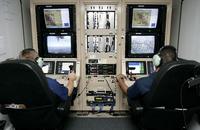-
Critics say drones make little contribution to border security

A new report says that U.S. Customs and Border Protection (CBP) drones are a wasteful giveaway to defense contractors and a threat to civil liberties. The report cites CBP own figures, the contribution drones make to border security is minimal. According to CBP calculations, drones have played a role in only 0.003 percent in drug seizure and 0.001 percent in illegal border crossing apprehensions.
-
-
McCaul to draft cybersecurity bill
House Homeland Security chairman Michael McCaul (R-Texas) said he was drafting his own cybersecurity bill, which will define the role of DHS in sharing information with private companies about cyber threats. McCaul hopes to agree on a compromise with the White House, which threatened to veto the bill.
-
-
DHS-funded police gear blurs line between crime-fighting and war-fighting

DHS is funding the purchase of military gear by Bay Area police departments. Critics of the program say the money allocated for the war on terror is blurring the line between local law enforcement focusing on crime fighting and soldiers fighting in an enemy war zone.
-
-
Sponsors of CISPA to address nagging privacy concerns about the bill
House Intelligence Committee chairman Mike Rogers (R-Michigan) and Ranking Member Dutch Ruppersberger (D-Maryland), sponsors of the Cyber Information Sharing and Protection Act (CISPA), say they are currently working on the draft to alleviate privacy concerns civil liberty advocates may have about the bill.
-
-
California city could become first in the state to ban drones
The City Council in Rancho Mirage, California was set to vote yesterday on a proposal which would ban the use of drones in residential areas in the city. If it passes, it will be the first law of its kind in the state. The ordinance would ban the flying of “unmanned aircraft that can fly under the control of a remote pilot or by a geographic positions system (GPS) guided autopilot mechanism” up to 400 feet above areas that have been zoned residential.
-
-
Exploring the human brain to support national security
The other day, at a White House event, President Barack Obama unveiled a new research initiative designed to revolutionize the understanding of the human brain. DARPA plans $50 million in 2014 investments to translate this increased understanding of brain function to create new capabilities.
-
-
Pervasive surveillance threatens privacy, gives power advantage to the watcher

Surveillance is everywhere, from street corner cameras to the subject of books and movies. A researcher says that pervasive surveillance menaces our intellectual privacy and it gives the watcher a power advantage over the watched, which can be used for blackmail, persuasion, or discrimination.
-
-
FBI wants 1994 online surveillance law updated
The FBI said the agency’s top priority this year is to update a surveillance law so authorities can monitor in real time Web activities of Americans suspected of committing crimes. The 1994 law, known as the Communications Assistance for Law Enforcement Act (CALEA), applies to telecommunication companies, but only partially to Web-based companies.
-
-
British public divided on merits of drone strikes

Fifty-five percent of the British public would support the U.K. government assisting in a drone missile strike to kill a known terrorist overseas, but support drops substantially if innocent casualties are likely, according to a new study.
-
-
In 2012, Microsoft received 70,665 law-enforcement requests for customer information
On Thursday, Microsoft released the number of law enforcement requests it has received for information on its hundreds of millions of customers. By releasing the information, Microsoft is now putting itself on the same team as Google, Twitter, Yahoo, and other Web businesses which have published reports on law-enforcement request for customer information. In 2012 Microsoft received a total of 70,665 law-enforcement requests for customer information.
-
-
Justice Department agrees 1986 snooping law should be reviewed
The U.S. Justice Department said earlier this week that it supports reviewing legislation which allows U.S. law enforcement officials to read someone’s e-mails without a search warrant. The 1986 Electronic Communications Privacy Act (ECPA) states that federal authorities only need a subpoena issued by a federal prosecutor, not a judge, to search through a person’s e-mails which are older than 180 days or which have already been opened.
-
-
WOT distorting focus, resource allocation of U.S. intelligence community: experts
The U.S. Intelligence Advisory Board, a panel of fourteen highly regarded and experienced experts, many of whom past holder of high-level national security positions, has submitted a secret report to President Obama in which they say that the intense, 12-year focus of the intelligence community on finding and fighting terrorism has distorted the priorities, resource allocation, and training within that community. Former Senator David Boren, a member of the panel, asks: “in the long run, what’s more important to America: Afghanistan or China?”
-
-
FAA gives Arlington, Texas police permission to use UAVs

The Federal Aviation Administration (FAA) has given the Arlington (Texas) Police Department permission to use two small helicopter UAVs. The FAA did lay out a set of rules for the police department to follow when using the drones.
-
-
Obama wants U.S. to influence debate over global drone rules
President Barack Obama wants the United States to help formulate global guidelines for the use of drones, especially as other countries, led by China, have begun to invest in their own drone fleets.
-
-
Widely used FBI surveillance method ruled unconstitutional

A national security letters (NSLs) is an administrative subpoena which allows the FBI to ask Internet companies and communication service providers to turn over subscriber information on American customers, while prohibiting the providers from informing these customers that their personal information has been turned over to the FBI. Since the 9/11 attacks, the bureau has issued an average of 50,000 NSLs a year. A federal judge in California says this is “rendering the statute impermissibly overbroad.”
-
- All
- Regional
- Water
- Biometrics
- Borders/Immig
- Business
- Cybersecurity
- Detection
- Disasters
- Government
- Infrastructure
- International
- Public health
- Public Safety
- Communication interoperabillity
- Emergency services
- Emergency medical services
- Fire
- First response
- IEDs
- Law Enforcement
- Law Enforcement Technology
- Military technology
- Nonlethal weapons
- Nuclear weapons
- Personal protection equipment
- Police
- Notification /alert systems
- Situational awareness
- Weapons systems
- Sci-Tech
- Sector Reports
- Surveillance
- Transportation
Advertising & Marketing: advertise@newswirepubs.com
Editorial: editor@newswirepubs.com
General: info@newswirepubs.com
2010-2011 © News Wire Publications, LLC News Wire Publications, LLC
220 Old Country Road | Suite 200 | Mineola | New York | 11501
Permissions and Policies
Editorial: editor@newswirepubs.com
General: info@newswirepubs.com
2010-2011 © News Wire Publications, LLC News Wire Publications, LLC
220 Old Country Road | Suite 200 | Mineola | New York | 11501
Permissions and Policies
